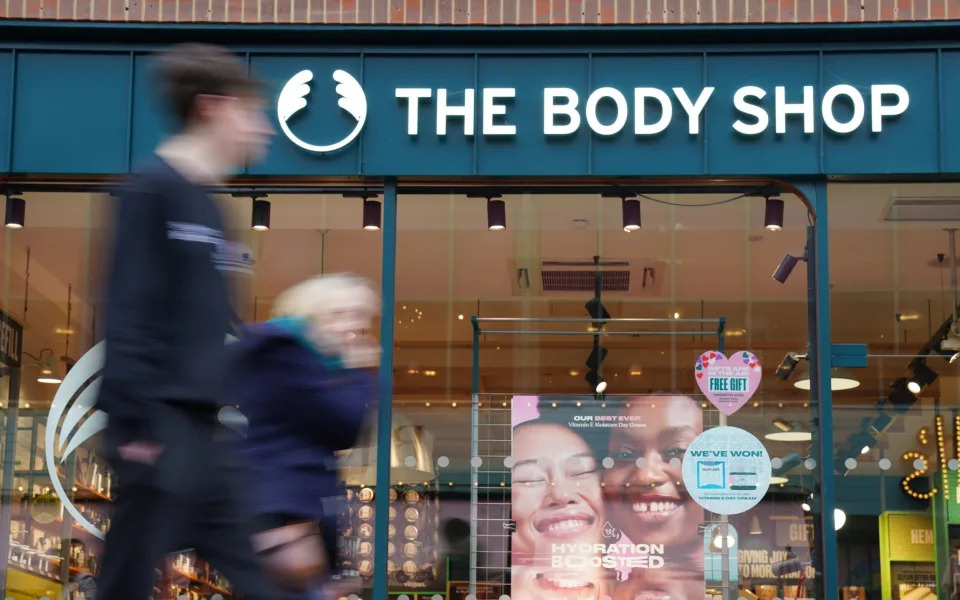Luke Barr
Fri, 19 April 2024

The Body Shop is closing its stores after falling into administration in February - Gareth Fuller/PA
The Body Shop collapsed after HSBC withdrew a line of credit and the chain’s private equity buyer failed to secure new funding, The Telegraph can reveal.
A shortfall worth at least £100m arose after Aurelius acquired the retailer in November, much of which stemmed from HSBC’s decision to withdraw credit facilities.
This “unplanned” funding gap led to the retailer’s rapid downfall in February, just three months after Aurelius bought The Body Shop from Brazilian cosmetics company Natura for £207m.
The revelations shed fresh light on the events that led to The Body Shop’s controversial administration and are likely to raise more questions about the collapse of the business.
HSBC is understood to have been a lender to The Body Shop through its parent company Natura.
The decision to sell the retailer triggered HSBC to revisit the relationship and the bank subsequently gave The Body Shop at least 18 months’ notice of its decision to stop lending.
It meant any potential buyer needed to refinance existing loans or seek alternative sources of credit to help keep The Body Shop afloat.
However, Aurelius failed to act on HSBC’s withdrawal, prompting the retailer’s UK arm to file for insolvency.
A source close to Aurelius claimed it was never made aware of HSBC’s decision to cut ties with The Body Shop.
After completing the acquisition in January, Aurelius discovered The Body Shop’s finances were allegedly in a worse state than expected, which sparked internal discussions over the firm’s due diligence.
Meanwhile, it is understood HSBC opted against taking on the private equity firm as a client as it was unable to carry out basic compliance checks.
Documents released by the administrators at FRP reveal details of The Body Shop’s demise. They state: “Following completion of the sale, the company was informed by its bankers that they intended to cease providing banking facilities.”
The decision led to the company being cut off from tens of millions of pounds in credit, which “ultimately resulted in a substantial unplanned cash outflow from the business”.
The administrators added: “These events combined gave rise to a forecast peak funding requirement for the company in excess of £100m, significantly greater than the requirement identified as part of the acquisition process.
“The substantial difference between the anticipated funding requirements and the reality of the company’s position, combined with the business’ poor trading performance, meant the shareholders could not commit to the required level of funding.”
HSBC’s withdrawal from The Body Shop and Aurelius’s failure to refinance loans represent the latest twist regarding the retailer’s collapse.
Hundreds of jobs have already been lost as part of the administration, with swathes of stores being forced to shut. Landlords are also braced for rent cuts as part of a planned Company Voluntary Agreement.
The Telegraph previously revealed that the taxpayer is bearing the brunt of The Body Shop’s redundancy costs, which has led to senior MPs calling for a deeper review into what went wrong.
Scrutiny was heightened last month after it emerged administrators are investigating claims that millions of pounds were taken out of the business before its sale to Aurelius.
Tensions rose further after former owner Natura criticised Aurelius for breaking a promise to pay around 30 Body Shop employees roughly £3m in awards.
The Brazilian cosmetics giant subsequently stepped in to pay staff members to defuse tensions.
A long list of creditors are owed millions of pounds as a result of the retailer’s insolvency, many of which will attend a meeting with administrators in the coming weeks.
Those owed money include a string of local councils across the UK, as well as companies such as Royal Mail, TikTok and The Boston Consulting Group.
Ironically, Natura is one of the largest creditors in the group as its subsidiary Avon is owed £12.8m by The Body Shop.
It is understood that Aurelius is in pole position to reclaim The Body Shop’s assets, shorn of debt, if no other bidder materialises during the administration process.
Labour’s Liam Byrne MP, chairman of the business and trade committee, told The Telegraph last month that The Body Shop’s failure is part of a “live research programme” into private equity’s role in the retail sector.
He said: “The Body Shop was a trailblazer for ethical enterprise and it now looks like it’s being crashed while the taxpayer picks up a big bill for redundancy payments.”
Aurelius, HSBC and FRP all declined to comment.
No comments:
Post a Comment